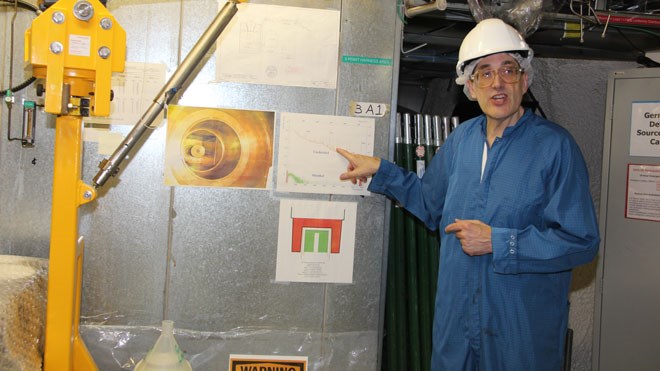"The questions we're dealing with attack some of the fundamental questions of contemporary science," Smith said.
While scientists aren't certain what dark matter or dark energy is, it makes up more than 80 per cent of the universe and would explain why the universe continues to expand at a faster and faster rate, rather than gradually being slowed by gravity.
But it is so small that background radiation has made it difficult to detect, making SNOLAB an ideal location for researchers.
"That's why we're underground, to get away from cosmic radiation," Smith said.
It's the sort of research that has made SNOLAB a leading facility for cutting-edge research, attracting experts and funding from across the globe, he added. There are currently 149 researchers from 70 institutions from across the world participating in the studies at SNOLAB, trying to get a better understanding of how the universe began.
"When you look in the night sky, what you see is only four per cent of the universe," Smith said. "We don't know what the rest is, and we're trying to address that question."
Answering the big questions also means SNOLAB is attracting the big dollars required to conduct long-term experiments. For example, they will take between three and five years to decide which research projects they will host at the facility – projects that will take as long as 20 years to complete.
Since they added another 5,000 square feet of laboratory space underground, the facility has attracted interest from several institutions interested in using that space.
"We have many people from all across the world coming to SNOLAB,” Smith said. "It's tens of millions of dollars of investment over a decade of construction, hundreds of researchers from around the world coming together in SNOLAB.
"We are putting Sudbury on the map in terms of fundamental astrophysics, and are attracting many people and many experiments to this area ... We are almost full, we are so attractive that we are basically are having to select experiments coming here."
Greater Sudbury Mayor Brian Bigger, who recently toured SNOLAB and invited Smith to address council, said the work they do is helping change how people view Sudbury.
"We're letting the public know that this type of science and research is occurring in Sudbury, and the types of people that are actually working in the lab and living amongst us in Sudbury, it's amazing," Bigger said.
"It does have a significant effect on Sudbury, our reputation, our international brand and our ability to attract these people into our communities."
Join Sudbury.com+
- Messages
- Post a Listing
- Your Listings
- Your Profile
- Your Subscriptions
- Your Likes
- Your Business
- Support Local News
- Payment History
Sudbury.com+ members
Already a +member?
Not a +member?
Sign up for a Sudbury.com+ account for instant access to upcoming contests, local offers, auctions and so much more.
